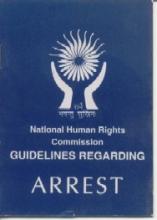Other Publications
Non-Priced Publications
The Publications brought out by the National Human Rights Commission are either free or priced. In case it is a priced publication, then a Demand Draft for the amount that covers the cost of the book has to be made in favour of the National Human Rights Commission, New Delhi payable at New Delhi . Some Publications are available in electronic format on this website. To view or download, simply click on the appropriate link provided.
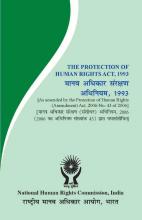
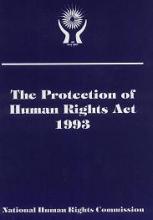
Contains the Act under which the Commission was constituted.
Provides an overview of the Commission's role, function and areas of concern.
Provides an overview of the Commission's role, function and areas of concern.
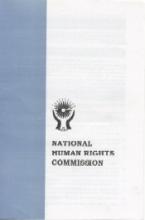


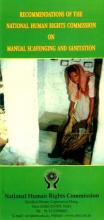
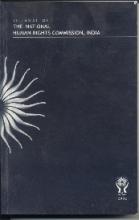
The first issue of the Journal on NHRC focuses on three broad themes: selected new developments in Indian human rights law, different ongoing struggles for human dignity and developments on selected human rights issues. The journal contains an article on the evolution on the National Human Rights Commission, 1993-2002: A Decennial View and articles on Domestic Violence,Rights of Dalits, Tribals and the Disabled. Under the current issues the Journal includes some important orders of the NHRC on Gujarat, opinion of the Commission on the Freedom of Information Bill,2000. Statement of the NHRC at the World Conference on Racism held at Durban etc.
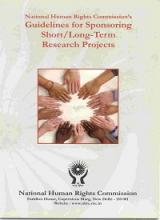
This monographs is produced by Investigation Division of NHRC as an effort to fill a critical void in the knowlege base about priosn sucide. In addition to a through review of the literature for prevention, this documents offers the most recent national data on the incidence and rate of prison sucide, effective prison sucide prevention programs, and discussion on legal liability issue. This monograph will encourage continued research, training, and development of comprehensive prevention polices that are imperative to the continued reduction of prison sucides throughout the country.
The Investigation Division of the Commission has been set up in accordance with the provisions of section 11(1) (b) of the Protection of Human Rights Act, 1993. One of the Important functions of the division is to conduct spot enquiries into complaints of Human Rights violations on the directions of the Commission and to submit its analysis and recommendations to the Commission.
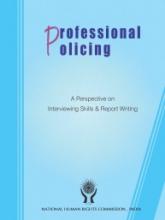
The publication, Professional Policing, was a collaborative outcome of two partnership projects of the National Human Rights Commission and the British Council, in 2002. The contents were widely acknowledged to be very useful and the feedback was really encouraging.
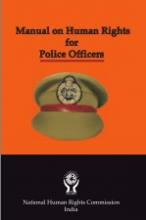
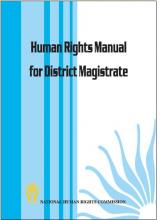
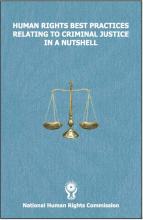
The handbook contains all International Human Rights Conventions.
This book is compilation of the initiatives taken by the NHRC to promote and protect the rights of Human Rights Defenders and encourage their efforts in promotion and protection of human rights.
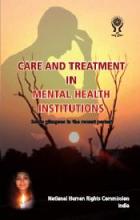
This publication is a compilation of visit reports undertaken by the Special Rapporteur of the Commission to mental health care institutions from 2009 to 2011. The compilation will give us an opportunity to assess the improvements that have taken place in the field of mental health care and treatment in India during these recent years.
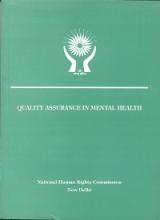
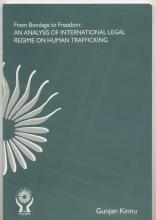
An Analysis of International Legal regime on Human Trafficking.
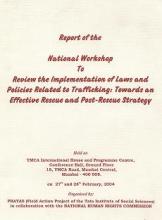
The workshop was held in collaboration with PRAYAS (A Project to the Tata Institute of Social Sciences), Mumbai in February 2004. Judicial Officers, Police Officers, Government Officials and the representatives of the Non-Governmental Organizations participated in the workshop.
The National Human Rights Commission thought it apt to bring out the revised edition. It consists of milestones at the national and international levels, critical analysis of the situation of children in India, role of NHRC in protecting and promoting children's rights and way forward.
enlist the convention on the rights of child passed on 20th Nov, 1989 by the United Nations Organisation
The Guidebook developed and designed jointly by Prasar Bharti Corporation and UNICEF aims to facilitate media intervention to protect the rights of children against sexual violence.
It is meant for professionals working in the media and hopes to encourage them to address the issue of sexual violence against children in a consistent, sensitive and effective manner, consonant with the rights and best interests of children.
The guidebook is the culmination of four workshops organized by the NHRC and Prasar Bharti, with support from UNICEF, for radio and television producers
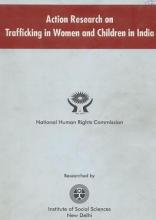
The Commission, the UNIFEM and the Institute of Social Sciences, New Delhi jointly conducted an Action Research to know the trends, dimension, factors and responses related to trafficking in women and children in India. The report made a number of recommendations to combat trafficking.
Discrimination Based On Sex, Caste, Religion and Disability
The National Council for Teacher Education developed the book under the aegis of the National Human Rights Commission. It is a Handbook to help the teachers to inculcate in their wards the ideas of non-discrimination on the basis of Sex, Caste, Religion and Disability. Besides conceptual framework, discrimination on each of the above grounds was discussed in-depth, as also implications for teacher education. Relevant International instruments have also been annexed.
*Availability -- Print (Second (Revised) edition 2004)
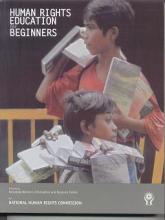
This manual has been prepared by Karnataka Women’s Information and Resource Centre, Bangalore by distilling material from a set of 10 dossiers prepared for University students. It covers articles on Rights of the Child, Rights of Disabled, Rights of the Dalits, Reproductive Rights, Human Rights and Environment, Land and Housing Rights, The Rights of Home based Workers, Gandhian Struggles for Land Rights, Rights of the Fish Workers and the Right to Information. They have been authored by eminent activist and academicians involved in their respective fields.
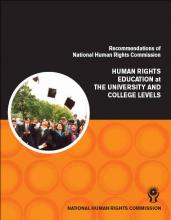
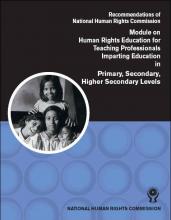
The NHRC has been concerned about the rights of the persons with disability. It has been making efforts to ensure that the provisions of the legislation namely, the Persons with Disability (Equal Opportunities, Protection of Rights and Full Participation) Act, 1995 are being implemented effectively, so that the relevant facilities are available to these people in accordance with the Act.
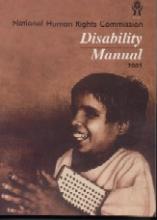
The Manual on Human Rights, Disability and Laws which was released in a print, Braille and accessible CD format at the National Conference on Disability in New Delhi on 23 June 2005, is a compilation of an impressive range of positive examples of disability jurisprudence. It explores a variety of general and disability specific instruments, such as core international human rights treaties, soft law instruments - declarations, proclamations and rules - in order to establish their relevance for persons with disabilities. The Constitution of India and relevant statutes have also been analyzed. A conscious effort has also been made to document examples of positive jurisprudence, disability specific as well as general, to encourage their wide utilization by legal practitioners and activists. *Version available - Print / Braille / Accessible CD (for the visually impaired)
This publication is a compilation of the proceedings of the conferences and meetings organized by NHRC on the subject of silicosis.
The National Human Rights Commission has taken upon itself the task of ensuring proper accessibility, quality and affordability of health care to the people of the Country, especially those belonging to the vulnerable and economically weaker sections of society as well as those people living in remote areas.
This book is compilation of 2 Volumes, the first being the report of enquiry into starvation and malnutrition related deaths of children and the second being a summary of field impression emanating from the visit and interaction with all institutional functionaries of all the 15 districts. The first part of the Enquiry Report also carried a detailed study of the current position of food supply and the extent by which the various schemes initiated by the Tribal Development Department, Govt. of Maharashtra have contributed to solve the problems of starvation and infant mortality on the ground.
This book is compilation of 2 Volumes, the first being the report of enquiry into starvation and malnutrition related deaths of children and the second being a summary of field impression emanating from the visit and interaction with all institutional functionaries of all the 15 districts. The first part of the Enquiry Report also carried a detailed study of the current position of food supply and the extent by which the various schemes initiated by the Tribal Development Department, Govt. of Maharashtra have contributed to solve the problems of starvation and infant mortality on the ground.
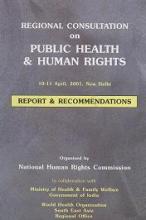
The National Human Rights Commission of India, in collaboration with the Ministry of Health & Family Welfare, Government of India and the World Health Organization, organized the Regional Consultation on Public Health and Human Rights in New Delhi on 10-11 April 2001. The Consultation sought to identify avenues of action conforming to human rights principles to advance public health objective in three priority areas, viz., access to health care, nutrition and tobacco control. The initiative brought together experts in public health, nutrition, law and human rights, and representatives of NGOs and international organizations. The publication contains a report on the Regional Consultation, the various presentations made, selected background papers and important recommendations.
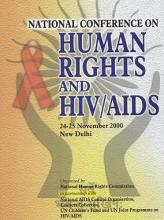
The National Human Rights Commission of India, in collaboration with the Ministry of Health & Family Welfare, Government of India and the World Health Organization, organized the Regional Consultation on Public Health and Human Rights in New Delhi on 10-11 April 2001. The Consultation sought to identify avenues of action conforming to human rights principles to advance public health objective in three priority areas, viz., access to health care, nutrition and tobacco control. The initiative brought together experts in public health, nutrition, law and human rights, and representatives of NGOs and international organizations. The publication contains a report on the Regional Consultation, the various presentations made, selected background papers and important recommendations.
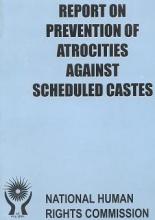
The Commission asked Mr. K.B. Saxena, a retired IAS Officer to prepare a status report on atrocities committed on Scheduled Castes and the initiatives which NHRC could take to check them. His report, which is now published, draws upon the reports of National Commission for Scheduled Castes and Scheduled Tribes and some of the researched documents prepared by Human Rights Organisations and Dalit NGOs. As a matter of deliberate design, academic orientation has been avoided and the perspective of implementing agency has been kept in view. The report contains a large number of recommendations for various authorities in the Centre and in the States.
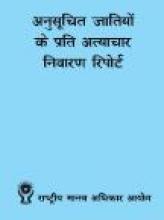
The National Human Rights Commission was constituted under the provisions of the Protection of Human Rights Act, 1993. The Mandate of the Commission is better protection of Human Rights, Accordingly in Section 2(1)(d) of the protection of Human Rights Act, "Human Rights means the rights relating to life, liberty, equality and dignity of the individual guaranteed by the Constitution or embodied in the International Covenants and enforceable by courts in India". Obviously human rights include all the rights necessary for an individual to lead a life with dignity.
The National Human Rights Commission was constituted under the provisions of the Protection of Human Rights Act, 1993. The Mandate of the Commission is better protection of Human Rights, Accordingly in Section 2(1)(d) of the protection of Human Rights Act, "Human Rights means the rights relating to life, liberty, equality and dignity of the individual guaranteed by the Constitution or embodied in the International Covenants and enforceable by courts in India". Obviously human rights include all the rights necessary for an individual to lead a life with dignity.
The Declaration was adopted at the National Colloquium on Population Policy: Development and Human Rights jointly organized by the Commission, Ministry of Health and Family Welfare and the United Nations Population Fund (UNFPA) in January 2003.
The 'Know Your Rights' series be published by the National Human Rights Commission, New Delhi in collaboration with the national Academy of Legal Studies and Research University (NALSAR), Hyderabad.
These publications are intended to assist a wide audience to achieve a better understanding of the basic human rights, and of the international and national machinery available to help realize those rights. The publications during 2004-05 in the "Know Your Rights" series are
- National Human Rights Commission,
- International Human Rights Conventions,
- Manual Scavenging,
- Bonded Labour,
- Child Labour,
- Sexual Harassment of Women at the Work Place
- Rights of Persons with Disabilities and
- Human Rights and HIV/AIDS
This book will, therefore, be important as it conveys his ideas regarding human rights in the form of articles, impeccably researched and put in precise form. making an interesting reading. The issues covered in these articles are of vital important and they also convey and effective role played by the National Human Rights in addressing them.
The writings are extremely engaging and include interesting facts, observation and anecdots, which keeps the interest of the readers alive. The auther's characteristic wit and humour lovingly draws attention of readers towards a need for greater commitment for human rights issues.
This publication aims at portraying the Commission's interpretation of retiral benefits as a human and its subsequent efforts to ensure a strong platform of Redressal for victims and families suffering from poverty and hardship, upon denial of their hard earned retiral benefits and dues.
Thirteen years is not a very long time in the life of an institution. It is, however, a time span enough to introspect and more importantly, chronicle the journey thus far. A journey that has been a myriad of emotions alternating between anguish, anger, frustration, satisfaction and almost always, deeply moving. The Commission has tried its level best to steadfastly remain focused on the fulfillment of its mandate.
Eighteen years is not a very long time in the life of an institution. It is, however, a time span enough to introspect and more importantly, chronicle the journey thus far. A journey that has been a myriad of emotions alternating between anguish, anger, frustration, satisfaction and almost always, deeply moving. The Commission has tried its level best to steadfastly remain focused on the fulfillment of its mandate.
The NHRC is mandated to visit jails or other institutions under the control of State Government, where persons are detained or lodged for the purposes of treatment, reformation or protection for the study of living conditions of the inmates and make recommendations thereon to the Government. These have been distributed into different volumes based upon the region in which the prisons are located. The first Volume covers 18 prisons located in the four States in Southern region, while the second Volume covers 20 prisons located in Union Territory of Chandigarh and 8 States. The third Volume covers 14 prisons located in the five States of North-Eastern region.
The NHRC is mandated to visit jails or other institutions under the control of State Government, where persons are detained or lodged for the purposes of treatment, reformation or protection for the study of living conditions of the inmates and make recommendations thereon to the Government. These have been distributed into different volumes based upon the region in which the prisons are located. The first Volume covers 18 prisons located in the four States in Southern region, while the second Volume covers 20 prisons located in Union Territory of Chandigarh and 8 States. The third Volume covers 14 prisons located in the five States of North-Eastern region.
The NHRC is mandated to visit jails or other institutions under the control of State Government, where persons are detained or lodged for the purposes of treatment, reformation or protection for the study of living conditions of the inmates and make recommendations thereon to the Government. These have been distributed into different volumes based upon the region in which the prisons are located. The first Volume covers 18 prisons located in the four States in Southern region, while the second Volume covers 20 prisons located in Union Territory of Chandigarh and 8 States. The third Volume covers 14 prisons located in the five States of North-Eastern region.
This compilation of reports for the open hearings conducted at Puri(Odisha), Ahmedabad (Gujarat), Chennai (Tamilnadu) and Jaipur (Rajasthan) gives a brief summary of the proceedings which took place during these open hearings and the type of relief provided by the Commission in such cases.
This contains the proceedings of the Commission on the situation in Gujarat following communal riots during the period 1 March, 2002 - 1 July, 2002
Implementing Economic, Social and Cultural Rights.
With the objective of ascertaining the views of all sections of society including academics, jurists, human rights activists, NGOs and others on the issue of Racism, Racial Discrimination, Xenophobia and Related Intolerance, as well as on issues relating to caste and race in India, the Commission held the first National Seminar followed by Public consultation in Bangalore on 3 & 4 August, 2001. The publication contains a report on the proceedings of the Seminar along with various papers presented at it.
With the objective of ascertaining the views of all sections of society including academics, jurists, human rights activists, NGOs and others on the issue of Racism, Racial Discrimination, Xenophobia and Related Intolerance, as well as on issues relating to caste and race in India, the Commission held the first National Seminar followed by Public consultation in Bangalore on 3 & 4 August, 2001. The publication contains a report on the proceedings of the Seminar along with various papers presented at it.

Priced Publications
The Publications brought out by the National Human Rights Commission are either free or priced. In case it is a priced publication, then a Demand Draft for the amount that covers the cost of the book has to be made in favour of the National Human Rights Commission, New Delhi payable at New Delhi . Some Publications are available in electronic format on this website. To view or download, simply click on the appropriate link provided.
To place order for any of the Publications, please contact
The Assistant Director (Publication), National Human Rights Commission, Manav Adhikar Bhawan Block-C, GPO Complex, INA, New Delhi - 110023 Ph. No. 011-24663231NOTE: For Priced Publication, kindly send DD in the favour of National Human Rights Commission.
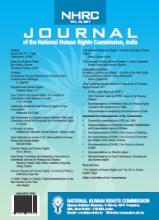
This is sixteenth issue of the Journal of NHRC.
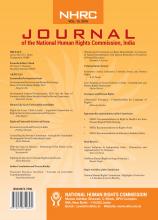
This is thirteenth issue of the Journal of NHRC.
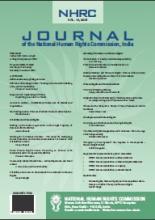
This is thirteenth issue of the Journal of NHRC.
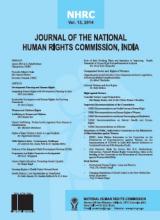
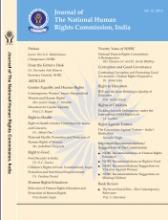
This is twelveth issue of the Journal on NHRC.
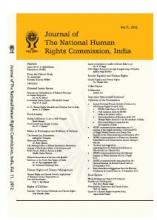
This is eleventh issue of the Journal of NHRC.
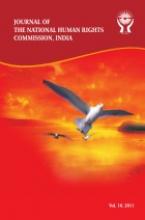
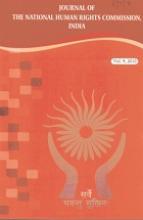
This is Ninth issue of the Journal of NHRC.
This is Eighth issue of the Journal of NHRC

This is Seventh issue of the Journal of NHRC.
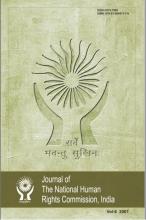
This is Sixth issue of the Journal of NHRC.
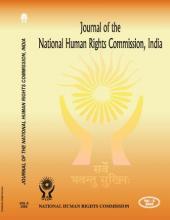
This is Fifth issue of the Journal of NHRC.
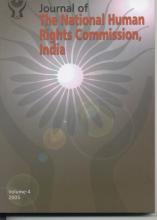
This is Fourth issue of the Journal of NHRC.
The 4th volume of the English Journal focuses on Human Rights Education and Awareness. Senior members from the Legal fraternity and academicians have contributed towards this issue. The journal also features important statements/decisions/opinions of the Commission during the year 2005 besides reviews on books on issues concerning human rights.
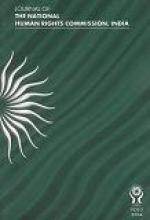
This is Third issue of the Journal of NHRC.
The third issue of the Journal of the National Human Rights Commission contains articles from experts on Human Rights issues related to terrorism, trafficking, right to information, intellectual property rights, agricultural biotechnology and psychosocial disability etc. The Journal also contains a section on important Statements/Decisions/Opinions of the Commission and a section on important reports.

This is Second issue of the Journal of NHRC.
The second issue of the Journal of the National Human Rights Commission contains important articles from eminent experts on Right to Development, Women's Rights, population stabilization, HIV/AIDS, Penal reforms, Right to housing etc. The journal also contains a section on important Statements/Decisions/Opinions of the Commission.
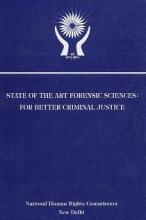
The Commission had constituted a Core Group to look into the question of effective use of forensic science in the criminal justice delivery system and improvement in forensic science services in the country. The book published in 1999 consists of an in-depth study of the existing forensic science support mechanism for identifying the shortcomings and elucidating the good practices in the forensic science system. It recommends improvement and strengthening of the existing laboratory and purposes establishment of new well-equipped forensic laboratory.
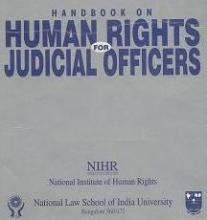
This handbook prepared by the National Institute of Human Rights of the National Law School of India university, Bangalore covers the important issues that trial Court Judges / Magistrates deal with in their everyday functioning and provides useful information that can enhance the Human Rights friendly quality their perspective. It is intended primarily to address the needs of Judicial Officers at the District level. It is also intended to be a useful tool for anyone interested in the protection of human rights.
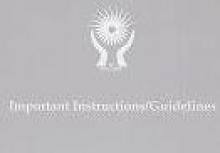
Since the inception of the Commission on 12th Oct, 1993, it has been receiving innumerable complaints against the public authorities who allegedly abused and misused their power to violate the human rights of innocent people. for dealing with the same, the Commission has been issuing instructions and guidelines from time to time for guidance of public servants and others.
Important Instructions/Guidelines of the NHRC (Second Revised) Edition
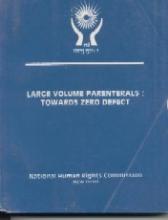
The NHRC had set up an expert committee to look into the manufacturing process and all other aspects relating to packing, storage, sale, distribution stocking, relevant rules and the entire regulatory system of Intravenous fluids. the Committee submitted a comprehensive report titled Large Volume Parenterals: Towards Zero Defect
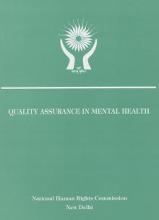
With a view to preparing a plan of action for improving conditions in mental hospitals in the country and enhancing awareness of the rights of those with mental disabilities, the Commission entrusted a research project to the National Institute of Mental Health & Neuro Sciences (NIMHANS), Bangalore. The book published in 1999 is the report of the investigation and research work done by the NIMHANS team. It has discussed at length the condition of mental health in the country and contains recommendations for improving the mental health care in all 37 mental hospitals in the country.
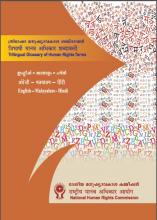
This glossary contains English alterative of the terms used by a cross section of people in Malayalam and Hindi in the human right discourse.
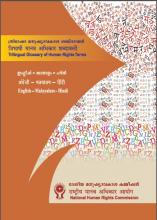
This glossary contains English alterative of the terms used by a cross section of people in Malayalam and Hindi in the human right discourse.
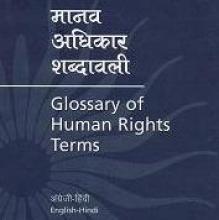
The glossary contains more than ten thousand words and has been divided into different sections viz. Glossary, words related to Designations, Organizations, Acts, Abbreviations, Conventions, Covenants, Protocols, parts of sentences and list of International instruments pertaining to human rights.
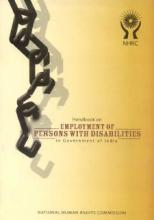
Right to work occupies centre-stage in the disability rights debate. The Centre and the State Governments have put in place an impressive range of legal frameworks and administrative mechanisms to boost employment of person with disability. This handbook is an attempt at making the instructions and their functionaries conversant with and sensitive to the complexities of legal and administrative arrangements
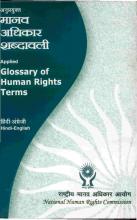
This glossary contains English alterative of the terms used by a cross section of people in Hindi in the human right discourse.
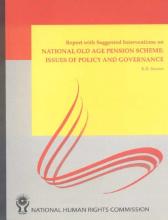
The book contains the legal framework for old age pensioners with a view to disseminate it widely and thereby sensitize government officials, NGOs and other stakeholders regarding the rights of the senior citizen.







 राष्ट्रीय मानव अधिकार आयोग, भारत
राष्ट्रीय मानव अधिकार आयोग, भारत


